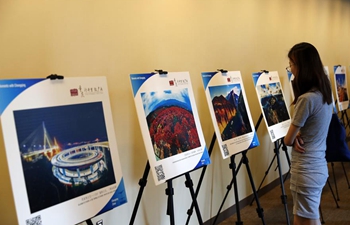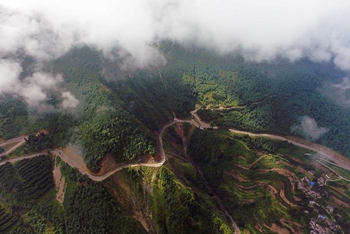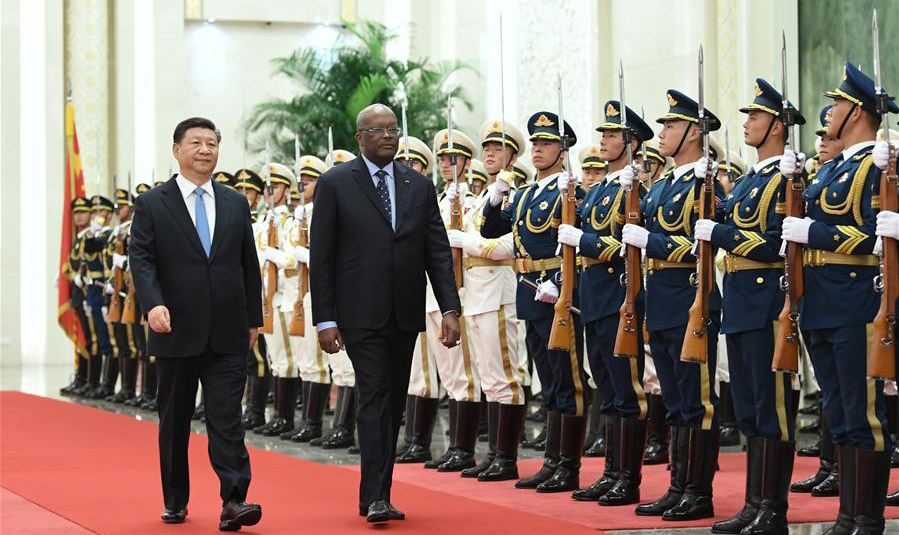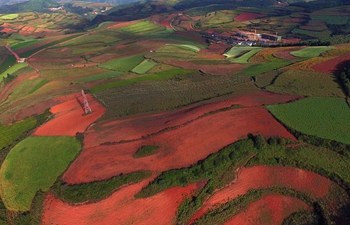WUHAN, Sept. 1 (Xinhua) -- When Professor Wang Qingfeng, a Chinese botanist, visited Kenya for the first time 17 years ago, he was amazed to find the secret of some Kenyans' snow-white teeth: they use branches of "toothbrush trees" to brush their teeth, instead of a toothbrush and toothpaste.
Seventeen years later, Wang's team and Chinese companies in Kenya have succeeded in making toothpaste with extracts from the tree native to Kenya. Their products are sold in Kenya and will debut in China at the first China International Import Expo held in November.
In addition to the toothpaste, Wang and his partners have also developed nutrients such as tea and capsules from local plants like moringa, an edible plant with many benefits.
"Africa is a treasury of plants and a magnificent site in the hearts of botanists," said Wang, 50, deputy director of Wuhan Botanical Garden of the Chinese Academy of Sciences.
In 1997, after completing his Ph.D., Wang set foot on the African soil for the first time in order to help the University of N'Djamena in the Republic of Chad establish a laboratory. Since then, he became a regular visitor to Africa and traveled to countries including the Republic of Madagascar, South Africa, Ethiopia, and Kenya.
Since 2010, Wang has conducted some 50 field surveys in Africa, during which his team discovered seven new plant species.
In the eyes of Gituru Robert Wahiti, a Kenyan botanist and Wang's Ph.D. student, Wang is an inspiring leader. He was particularly impressed by how Wang uplifted a frustrated team on their seemingly vain trip to look for a rare plant species in the dense jungles of Mount Kenya.
On the fourth straight day of the search, some members of the team, consisting of both Chinese and Kenyan researchers, started to back down due to the tedious trek, thin air, low temperatures and mountain sickness.
"He gathered the team in a shallow depression on the mountain slope and encouraged the members to carry on with the field exercise, appealing to their sense of teamwork, friendship, and dedication to their research," Gituru recalled.
Though their voices were hoarse and off-key, the team lifted their spirits and joined in the chorus of a renowned Kiswahili song.
Finally, in a depression at the foot of a slope, the botanists broke out in jubilation at the sight of a flourishing patch of the rare plant species.
"All the members shook Prof. Wang's hand, and some even hugged him," said Gituru.
Other challenges in field surveys in Africa included blood-sucking mites and wild animals, as well as natural disasters such as landslides.
In 2013, he became the director of the Sino-Africa Joint Research Center of the Chinese Academy of Sciences, which is staffed with researchers from 18 Chinese research institutions and their counterparts from eight African countries.
"It took us five years to build the research platform from scratch. Chinese institutes and universities now can engage with the African researchers, promoting research capabilities in Africa as well as commercializing the research results," said Wang.
Wang is also compiling the flora of Kenya with the National Museum of Kenya.
"This is an ongoing process that is expected to make a great contribution to the conservation and protection of the plants which constitute an important part of the natural heritage of Kenya," Gituru said.
"We plan to spend 10 to 15 years drafting the flora and the book is expected to cover around 7,000 plant species in Kenya. If we can make it, that will be a great honor for us all," said Wang.















